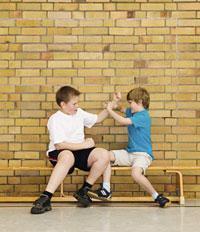Self-Control is one of the most important skills for children’s academic performance and social well-being. Kids who struggle with Self-Control commonly have difficult managing their emotions, making wise decisions and understanding how their actions impact those around them. Developing Self-Control in children help them learn to control their feelings, deal with frustrations and not get discouraged by difficult obstacles or setbacks. Kids who exhibit strong Self-Control skills are able to reduce impulsive actions and stop themselves from engaging in inappropriate and impulsive behavior.
Below, you’ll find some general tips and strategies for ways to support the development of strong Self-Control skills in your child.
Tips for Teaching Kids Better Self-Control:
1.) Anger is OK. It’s okay for your child to get angry sometimes. There are legitimate reasons to feel anger on occasion. The message you communicate to your child should not be, “don’t get angry,” but rather to take a step back and consider whether the particular concern is worth frustration. Subsequently, it is important for your child to understand how to express and control anger. Explain to your child that anger and frustration are a normal part of life and that holding it in can often be as problematic as letting it out inappropriately. It is important to help your child understand how to articulate anger in a healthy way.
2.) Make it funny. When a child is particularly angry or losing self-control, sometimes humor can be a very powerful anridote. Make sure that when using this strategy, you are not taunting or minimizing your child’s concerns, but it is often helpful to turn the anger and frustration into another topic that is funny and humorous.
3.) Stop and think. Play a “game” with your child in which you each ask each other questions, but that you cannot respond to the question for a period of 10 seconds. When you do this, count out loud to 10, and clearly make an effort to think about the answer to the question before responding. Talk with your child about how this may be a useful tool to him in the classroom or other settings. Note that he does not always have to count to 10, and simply counting to 3 sometimes may be adequate enough. This is particularly helpful if your child tends to raise his hand without knowing the answer in class, or blurt something out before being called upon.
4.) Relax! Sometimes the most important thing that an adult (or child) can do when they are frustrated or angry is to take a break from what they are doing. When talking about relaxing, it is not simply getting away from something, but actually doing something else that will reduce stress for a brief period of time. Know what relaxes your child. Be willing to use this tool if you feel that your child will not be able to control himself effectively. Be careful not to use this strategy so that your child avoids the situation that he needs to deal with. For example, if your child is becoming overly frustrated with his math homework, have him take a break to watch SpongeBob, and then return to complete his work. But leaving his math homework to watch television without returning to complete it allows him to avoid learning how to handle his frustration.
5.) Have fun. Play board games where you have to wait your turn. Start by practicing gameplay with your child and then arrange for him to play games with other children that require him to wait for his turn. A popular game that involves patience is Risk, while a game that involves both patience and concentration when counting the number of spaces to move, is Trouble. Chess and Checkers can also be helpful to improve concentration and patience because both games require constantly thinking about the next move.




